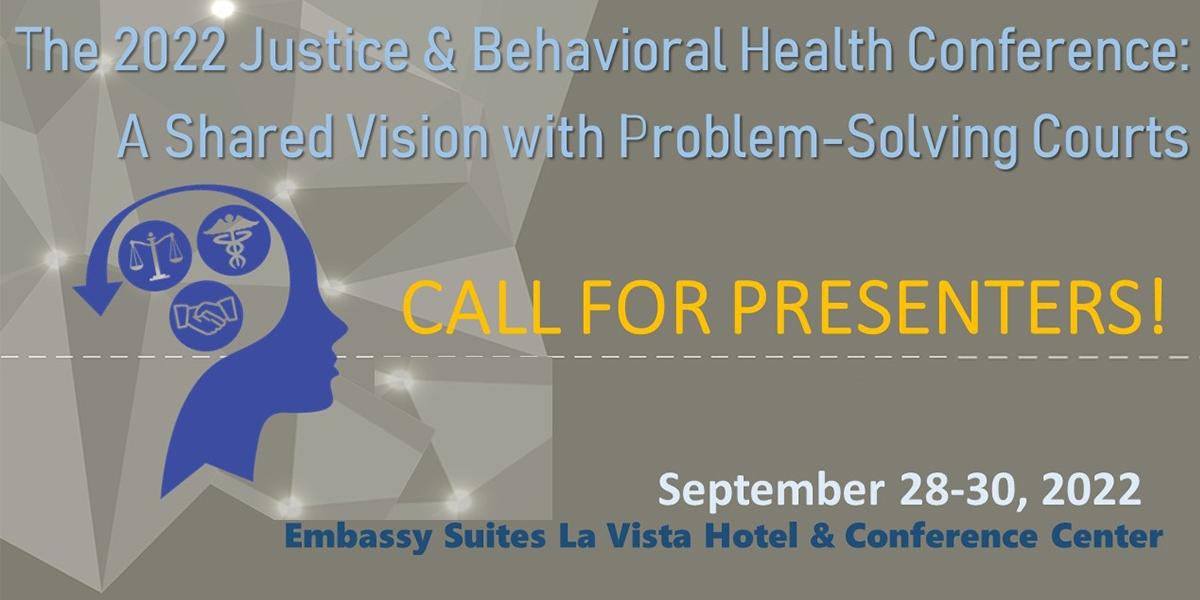Call for Presenters - Justice and Behavioral Health Conference
The Nebraska Administrative Office of the Courts & Probation is hosting the second Justice and Behavioral Health Conference this fall. Nebraska's behavioral health and justice systems, along with community partners, share a collective goal of promoting constructive change through rehabilitation, collaboration, and partnership to enhance safe communities. This year’s conference theme is A Shared Vision with Problem-Solving Courts, which continues efforts to build a comprehensive community response. Featured topics will relate to justice-involved individuals in all phases of system involvement including, but not limited to, participation in problem-solving courts.
Abstracts are now being accepted for breakout session presentations for the September 28-30, 2022 event at the Embassy Suites in La Vista, NE.
We welcome your submission!
Please read this page carefully before you begin work on your proposal. Proposals will only be accepted through this online form. If submitting for more than one presentation, please complete a separate entry for each proposal.
We are seeking presenters who offer unique insights; evidence-informed strategies; timely information on new and emerging issues; and relevant content for improving outcomes for justice-involved individuals. Additionally, you are encouraged to structure your presentation proposal around the conference theme and address one or more of the following conference tracks:
- Suicide – Evidence-based frameworks to help identify individuals and populations at an increased risk for suicide and inform effective prevention, intervention, and coping strategies.
- Mental Health and Substance Use – Addressing the impact of criminogenic risk factors on assessment, motivation for change, and treatment readiness and planning across the continuum of care.
- Diversity, Equity, and Inclusion – Encouraging knowledge and skills to be mindful of norms, implicit/explicit biases, attitudes, and language to promote programs, policies, and practices that are culturally competent and trauma informed.
- Special Populations – Adjusting programmatic approaches and communication styles to consider the targeted population or individual’s culture. The following should be considered: Youth and Emerging Adults; Veterans; Adults; LGBTQ; High-Risk Caseloads (i.e. Domestic Violence, Sexual Offenses, and Problematic Alcohol and/or Substance Use); Gender Specific Programming; and Specific Racial and Ethnic Groups.
- Supervision Strategies – Case management and contingency management principles, restorative practices, reintegration, drug identification/trends, monitoring tools, and working within a multidisciplinary team.
- Staff Development, Self-Care and Resiliency – Innovation in leadership, professional development, and strengthening the workforce. Self-care skills to support well-being and resilience at times of change and adversity.
- Problem-Solving Courts – Best practices for service delivery, collaboration, and specialty court programming supported by research and evaluation outcomes.
Required Proposal Information:
- PRESENTATION TITLE
- DESCRIPTION OF THE BREAKOUT SESSION: A clear, concise, and accurate description of the proposed breakout session (maximum: 150 words).
- TOPICS TO BE COVERED: Select the primary topic(s) to be addressed in your presentation from the tracks identified above. (Up to three may be chosen.)
- LEARNING OBJECTIVES: List a minimum of three (3) learning objectives by describing the measurable skills, knowledge, and/or new capacity the participant will gain from this presentation.
- PRESENTER(S) CONTACT INFORMATION: Provide name, title, agency, address, phone, and email for all proposed presenters. Panel presentations should consist of no more than four persons, including the moderator.
- BIOGRAPHY: Include a short bio for each presenter (no more than 300 words and in 3rd person).
*If selected as a presenter, the information you provide will be used in the conference program. Please be sure the spelling is correct and all information relevant to each presenter and the proposed presentation is included.
Deadline for submitting is Friday, March 18, 2022. Late proposals will not be accepted.
Please click here to begin: https://ncip.az1.qualtrics.com/jfe/form/SV_2aCPKDS1YRyRvKK

